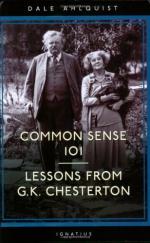|
This section contains 3,881 words (approx. 13 pages at 300 words per page) |

|
SOURCE: “Chesterton's Metapoetics,” in Renascence, Vol. XXIII, No. 3, Spring, 1971, pp. 137-44.
In the following essay, Petitpas examines the philosophical, Christian, and Romantic elements that influence both Chesterton's own poetry and his ideas about poetry in general.
Critics of poetry may be conveniently grouped into two categories: purely poetic critics who in a rigorous scientific spirit isolate a poem from extrapoetic reality, dwelling upon its internal relationships and evaluating it primarily by the principle of coherence; and, metapoetic critics who in a more philosophic spirit relate a poem to other reality, drawing out its transcendental dimensions and evaluating it primarily by the principle of correspondence. When Bradley defends the idea of “Poetry for poetry's sake”; when MacLeish affirms that “a poem should not mean / But be”; when Auden concludes that “poetry makes nothing happen”;—they are speaking in the voice of the purely poetic critic. On the other hand...
|
This section contains 3,881 words (approx. 13 pages at 300 words per page) |

|


